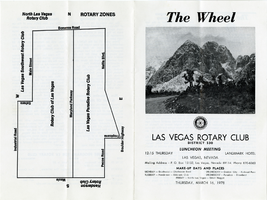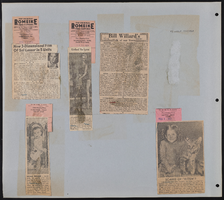Search the Special Collections and Archives Portal
Search Results
Station Casinos Publicity Collection
Identifier
Abstract
The Station Casinos Publicity Collection (1995-2013) contains magazine articles, newsclippings, and photographs about various Station Casinos properties in Las Vegas, Nevada. A transition report published by Station Casinos in 1998 is also included.
Archival Collection

Transcript of interview with Jay Duarte by David G. Schwartz, January 27, 2017
Date
Archival Collection
Description
Text
March, Debra, 1953-
Debra March was born November 25, 1953 in Detroit, Michigan. She is one of eight siblings, all of whom attended Catholic school as children and eventually went on to professional careers. March’s father worked for the city of Detroit, then moved to Las Vegas, Nevada and was hired by the Clark County School District. March came to Las Vegas for the first time in 1973. Though she left for a couple of years, she eventually settled there and attended the University of Nevada Las Vegas (UNLV), earning an undergraduate degree in anthropology and biology.
Person

Alpha Kappa Alpha Sorority, Theta Theta Omega Chapter regional conference report
Date
Archival Collection
Description
From the Alpha Kappa Alpha Sorority, Incorporated, Theta Theta Omega Chapter Records (MS-01014) -- Chapter records file.
Text

Transcript of interview with Thalia Dondero by Claytee D. White, March 6, 2014 and April 2, 2014
Date
Archival Collection
Description
Text

Transcript of interview with Howard E. Hollingsworth by Joseph Concannen, February 23, 1979
Date
Archival Collection
Description
On February 23, 1979, collector Joseph Concannen interviewed educator, Howard E. Hollingsworth (born October 3rd, 1927 in Preston, Idaho) in J. D. Smith Junior High School in Las Vegas, Nevada. This interview covers the history of Nevada. Mr. Hollingsworth also discusses the Mormon Fort, ranches, and the railroad.
Text

Transcript of interview with Linda Hartley by Pauline Marchese, March 10, 1978
Date
Archival Collection
Description
On March 10, 1978, Pauline Marchese interviewed her neighbor, Linda Hartley (born in 1941, in Cedar City, Utah) in her home at 5261 South Jane Way, Las Vegas, Nevada. During the interview, the two discuss Hartley’s personal history, such as schools that she had attended and her recollection of local recreational activities. The two go on to talk about changes in crime, the environment, and briefly discuss a variety of issues at the time, including: segregated schools, prostitution, and effects of the Nevada Test Site.
Text

The Wheel Las Vegas Rotary Club newsletter, March 16, 1978
Date
Archival Collection
Description
Text


